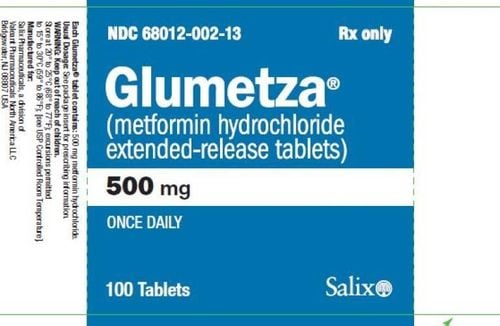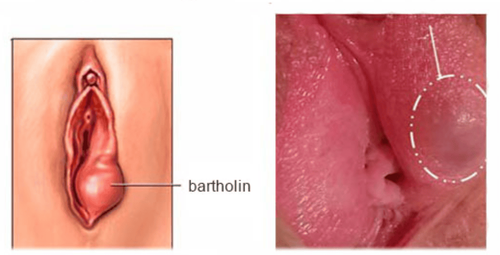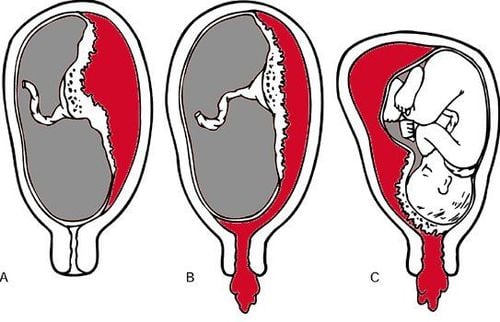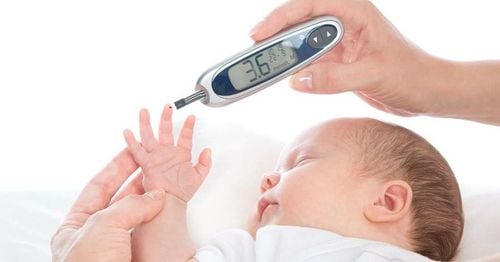This is an automatically translated article.
The article is professionally consulted by Master, Doctor Phan Thi Cam Van - Neonatologist - Pediatrics - Neonatology - Vinmec Danang International General HospitalBlood sugar is the amount of sugar that moves through the blood stream and provides energy for the vital activities of all cells in the body. In rare cases, blood sugar can drop too low and cause neonatal hypoglycemia.
1. What is neonatal hypoglycemia?
Glucose is the main fuel source for the brain and body. Hypoglycemia occurs when blood glucose levels are too low.
In babies, low blood sugar can happen for many reasons. Whatever the reason, the consequences of neonatal hypoglycemia can cause irreversible permanent brain damage if not detected early and intervened, even affecting the child's life.
2. What causes hypoglycemia in babies?
Hypoglycemia in the newborn can be the result of the following conditions:
Maternal nutrition is too poor during pregnancy. Taking too much insulin because the mother has poorly controlled diabetes The mother's and baby's blood types are incompatible (severe hemolytic disease of the newborn) The baby's insulin levels are too high for different reasons, for example such as pancreatic tumor Congenital defects Congenital metabolic disease or hormone deficiency Insufficient oxygen at birth (asphyxia) Congenital liver disease Severe infection In addition, newborns are at risk for hypoglycemia very high if the following factors are present:
Babies born to mothers with diabetes Low birth weight babies Premature and extremely preterm babies Babies born to mothers treated with certain drugs such as terbutaline Older babies
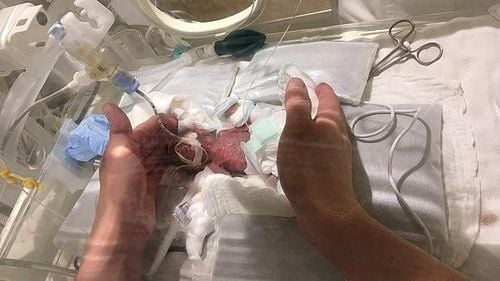
Trẻ sinh cực non có thể gây nguy cơ bị hạ đường huyết
3. What are the symptoms of hypoglycemia in infants?
Signs of low blood sugar may not be obvious in infants. However, the most common signs include:
Tremors Pale skin and lips Prolonged pauses in breathing Low body temperature ( hypothermia ) Soft muscles (poor muscle tone) Poor sucking flexible, lethargic Convulsions Signs of neonatal hypoglycemia can depend on other health conditions. Therefore, just observing that a baby has one of the above signs or has any abnormal signs, especially in those with risk factors, should soon suspect neonatal hypoglycemia and prompt intervention until this diagnosis is completely ruled out.

Trẻ bú kém khi bị hạ đường huyết sơ sinh
4. How to diagnose hypoglycemia in infants?
A simple blood test to determine blood sugar levels can diagnose this problem quickly and clearly.
For infants at high risk of neonatal hypoglycemia, a blood test to measure blood sugar is recommended every few hours after birth. This is easily done in bed using a drop of blood taken from the heel. This indication should be continued when the risk factors improve and blood glucose levels are stable for at least 12 to 24 hours afterward.
5. How is hypoglycemia in a newborn treated?
The treatment of neonatal hypoglycemia will depend on the gestational age, overall health of the baby and will be done quickly as soon as there are signs of suspicion without a definitive diagnosis.
Treatment includes providing the baby with a fast-acting source of glucose. This can be done simply with a mixture of glucose and water or formula feeding. In case the baby cannot suckle due to lethargy or lethargy, the child needs to be given intravenous glucose infusion.
After that, the baby's blood glucose levels still need to be checked periodically after treatment to rule out neonatal hypoglycemia from occurring again.

Hỗn hợp glucose sẽ được trộn vào sữa cho trẻ
6. Is hypoglycemia dangerous in babies?
Neonatal hypoglycemia is extremely dangerous because it is difficult to detect early and its severe consequences if not timely intervention.
The brain needs blood sugar to function. Since this is the only source of energy for brain cells to function, when there is not enough glucose, cells switch to anaerobic metabolism, producing adverse and possibly toxic products to the brain. Even severe or prolonged hypoglycemia can cause seizures and serious brain injury.
At this time, the child's neuropsychological functions will no longer be guaranteed. Children are prone to seizures, develop incompletely in the first years of life, and may be at risk for long-term problems in learning and developing skills as they grow up...
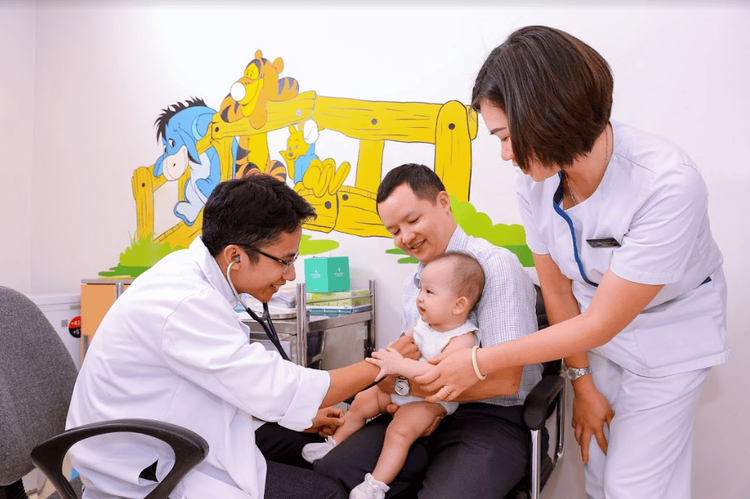
Cha mẹ nên đưa trẻ đến gặp bác sĩ để được thăm khám kịp thời
7. What can be done to prevent hypoglycemia in infants?
In most cases, there can often be no way to prevent neonatal hypoglycemia.
For a baby with pre-existing risk factors, more attention needs to be given to the adequate supply of nutrients. At the same time, it is necessary to teach parents or carers how to carefully monitor for signs of hypoglycemia, how to measure blood sugar at home, and treat it as soon as possible.
For pregnant women with diabetes, it is recommended to keep blood sugar levels in the normal range during pregnancy. This will help reduce the risk of low blood sugar for the baby after birth.
In a nutshell, neonatal hypoglycemia is a condition where the blood glucose level is lower than normal. Babies are at higher risk if they are born to a mother with diabetes, were born prematurely, or were born prematurely. At this time, when your baby shows signs of neonatal hypoglycemia, immediately give him formula milk or a mixture of glucose and water to improve blood sugar levels and prevent long-term regrettable brain damage.
To register for a visit at Vinmec International General Hospital, you can contact Vinmec Health System nationwide or register online HERE.
MORE:
Neonatal diabetes: What you need to know Objects at risk of neonatal hypoglycemia Hypoglycemia in newborns: Signs and management




